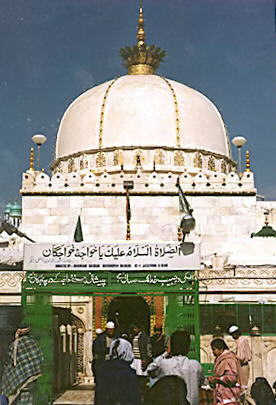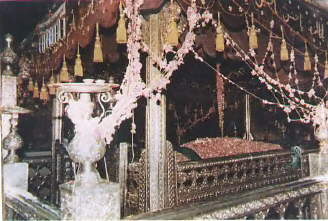
The Dargah Sharif (Noble Shrine) of Gharib
Nawaz, r.a.

The Dargah Sharif (Noble Shrine) of Gharib
Nawaz, r.a.
To print this article in PDF format (4 pages): click here
Historical Sketch
It is a well known historical fact that in spreading the ethical and spiritual values of Islam, major and effective contributions have been made by the walis (saints) of Allah. It was their humanism, disposition and piety which won over the hearts of hundreds of thousands of people. They contacted the masses directly. They served and loved them. They lived with them and inspired them in the realisation of Eternal Truth. The proof of this is more than evident from the history of the growth of Islam in India. Although India was penetrated in the first century of Hijra, the noble task of inspiring the people to its tenets and values was accomplished by Hazrat Khwaja Muinuddin Chishti, r.a. popularly known as Khwaja Sahib and Khwaja Gharib Nawaz. He did it all through his own great moral power, glorious and appealing character, with love and dedication to mankind, without any worldly resources of wealth, power, force or support.
Khwaja Sahib was a scholar of great repute. He interpreted the true Islamic message of love for mankind and through that, love for the Almighty Creator. He preached the Qur'anic philosophy of unity of religion and worked out its potentialities for the whole of humanity. He was the greatest mystic of his time. He laid the foundation of the liberal Chishtia order of Sufis in India, and inspired millions of souls to be his followers, and thus served the masses of the Indian sub-continent.
Hazrat Khwaja Muinuddin Chishti (r.a.)
Birth: Early life and Education
Khwaja Muinuddin Chishti, r.a. was born in Seistan (East Persia) also known as Sajistan, around 533 Hijri (1138-39 A.D.) in a well respected family. His father, Khwaja Ghayasuddin, r.a. and mother, Syeda Bibi Ummalwara (alias Bibi Mahe-Noor), were the descendants of Hazrat Ali, r.a. through his sons Imam Hassan and Imam Hussain. Khwaja Sahib lost both his father and mother at an early age of sixteen years. He inherited an orchard and millstone which were his means of livelihood. One day when Khwaja Sahib was working in his orchard, a pious dervish and majzoob, Ebrahim Qandoozi, came and took his seat under the shade of a tree. When Khwaja Sahib saw him, he brought a bunch of grapes and presented it to his guest. The visitor ate the grapes and was delighted. He then took something out of his bag, chewed it, then offered it to his young host. Khwaja Sahib ate it without any hesitation, and at once the light of wisdom and knowledge dawned upon the young Khwaja. Immediately he disposed of all of his worldly belongings and distributed the money amongst the poor. Having thus broken all the ties with worldly affairs, he set off for Samarkand and Bokhara then the great centres of learning for religious education and knowledge.
When Khwaja Sahib had acquired the best knowledge and wisdom of the time, he travelled widely in search of a Pir (spiritual guide) who could provide him with the best spiritual guidance. He came to know of Hazrat Khwaja Usman Harooni , r.a, who was the greatest scholar and unrivalled spiritual guide of that period. In the very first meeting, Khwaja Sahib completely submitted himself to his Murshid and remained in the company of this great divine spiritual leader, for twenty years and served him devotedly, passing through the various stages of spiritual life. Thus the great Murshid trained and elevated Khwaja Sahib to the highest spiritual attainments.
Hajj and the Prophet's (s.a.w.s) Command
As the great Khwaja Sahib became accomplished and perfect in every respect, the divine tutor honoured him with the robe and took him to Hajj. Both then proceeded to Mecca and performed the Hajj, and then went to Medina and stayed there for some time, to receive blessings from the prophet of Islam (s.a.w.s.)
One night, while in a trance, he was ordered by the Holy Prophet Muhammad (s.a.w.s.): "O Muinuddin! you are a prop of our faith. Proceed to India and show the Path of Truth to the people there." In compliance with the above spiritual command, Khwaja Sahib left Medina for India. He continued his journey, passing through Isfahan, Bokhara, Herat, Lahore and Delhi meeting several prominent Sufis of the period. He arrived at the barren and desolate land of Rajputana which is now known as Rajasthan. On his way to India, he enrolled large numbers of people into his fold and blessed thousands of others with spiritual power.
Khwaja Muinuddin Chishti, r.a., arrived in Ajmer at the age of 52 years around 587 A.H. (1190 A.D.), on his divine mission, unique in the annals of Islam. His only armour for the success of his great mission was the greatest "invisible power" that pervades and sustains the whole universe. At that time, Ajmer was ruled by Prithvi Raj Chauhan, the famous Rajput king. In his court, he had a large number of powerful magicians with Ajai Pal as their leader. Khwaja Sahib stayed on a hill close to Ana Sagar lake now known as the Chillah Khwaja Sahib. When the news spread that a very pious Dervish had come to Ajmer, people began to flock to him in increasing numbers. Whoever came to him, received the kindest treatment and blessings. People were so much inspired by his divine teachings and simplicity that they began to embrace Islam. Many became his disciples. Even Ajai pal submitted himself to the divine powers of Khwaja Sahib, gave up all his magic and became his disciple.
Meanwhile, Shahabuddin Ghori again attacked India, in 1192 A.D., and in the famous battle of Tarain, defeated Prithvi Raj. When Shahabuddin Ghori came to know of the presence of Khwaja Sahib at Ajmer, he personally came to see him at his place, and enjoyed the grace of his meeting.
Khwaja Sahib continued his noble magnificent mission, showing the Path of Truth to the people. He also sent his disciples and successors to the different part of the country who also served the people and preached the tenets of Islam. A few of his prominent successors are:
1. Hazrat Khwaja Qutbuddin Bakhtiar Khaki, r.a. (Delhi. ob. 1236)
2. Hazrat Shaikh Fariduddin Ganj-e-shakar, r.a., (Pak Pattan ob. 1265)
3. Hazrat Shaikh Nizamuddin Awlia (Delhi, ob. 1325)
4. Hazrat Shaikh Nasiruddin Chiragh Delhi (Delhi, ob. 1356)
Khwaja Sahib Breathes His Last
After achieving the objectives of his mission and complying with the command given to him by the Holy Prophet (s.a.w.s.), his noble soul left the mortal body on the 6th of Rajab 633 A.H. (March 16, 1236) at the age of 97. He was buried in the same cell which was the centre for his divine activities, throughout his stay at Ajmer. Today his tomb is popularly known as The Dargah Sharif (holy tomb). People of all walks of life and faith from all over the world, irrespective of their caste, creed and belief, visit this great shrine to offer the flowers of their esteem and devotion. The rich and the poor stand side by side to pay homage and respect to this divine soul.
Mission and Teaching of Khwaja Sahib
The life and mission of Khwaja Sahib have been of an exceptional character as compared with any other saints in India. His simple teaching penetrated even the stoniest of hearts, his affectionate look silenced his fiercest of enemies. His matchless piety and blessings knew no distinction and his "Spiritual Power", amazed and defied his bitterest adversaries who came in order to harm him, but were inspired instead to embrace Islam and become his devotees for the rest of their lives. He brought the message of Universal Love and Peace. He chose the way of non-compulsion in the true spirit of the Holy Qur'an, which says:
"Let there be no compulsion in religion. Truth stands out clear from error; whoever rejects evil and believes in Allah hath grasped the most trustworthy hand-hold that never breaks. And Allah heareth and knoweth all things." [Qur'an 2:256]Khwaja Muinuddin Chishti, r.a. followed this dictum strictly throughout his mission. It is because of this that he became popularly known as Gharib Nawaz, which means 'the one who shows kindness to the poor'. This was later reinforced by succeeding Chishti Sufis, who became religious pioneers in national integration in the country. They fulfilled the objectives of bringing together the various castes, communities and races, elevating humanity from the swamp of materialistic concerns, which is leading mankind to destruction even today.
The teachings of Khwaja Sahib have been recorded in several books on mysticism. The essence of his teachings are:
The true friend of Allah is one who has these
three qualities:
1. A friend of God must have affection like the sun. When the sun rises,
it is beneficial to all. All persons derive heat and light from it irrespective
of whether they are Muslim, Christian, Seik,
Hindu, etc.
2. A friend of God must be generous like an ocean or a river. We all get
water from the river or sea to quench our thirst. No discrimination is made
whether we are good or bad or whether we are a relation or a stranger.
3. A friend of God is one who has the quality of hospitality like the earth.
We are raised and cradled in its lap, and it is always spread below our feet.
The noblest of characters is possessed by one
who is:
1. Bountiful in poverty.
2. Content in hunger.
3. Cheerful in grief.
4. Friendly in hostility.
The surest way to ward off the eternal punishment
of hell is:
1. To feed the hungry.
2. To redress the aggrieved.
3. To help the distressed.
Sacred Sayings of Khwaja Muinuddin Chishti, r.a.
1. Without performing Namaz (prayer), none can approach Allah (God), because Namaz is the climax (mi'raj) in the process of such an approach for the pious.
2. If all the rules of Namaz were not followed properly, it is struck back on the face of him who offers such a Namaz.
3. The heart of a lover (True lover of Allah) constantly burns with the fire of love, so much so that whatever intrudes upon its sanctity is burnt to ashes.
4. A sin committed does not harm an individual so much as looking down upon one's own fellow human beings.
5. Of all the worship that pleases Almighty Allah, the most is the granting of relief to the humble and the oppressed.
6. Performance of charity is the key of attaining the estate of a philanthropist.
7. The one who does not perform devotion of Allah is engaged in the career of earning a sinful living.
8. There are four cardinal virtues of the individual self: (i) refraining from begging in the state of penury; (ii) showing the attitude of being well-fed when feeling hungry; (iii) maintaining a cheerfulness in the time of sorrow; and (iv) befriending the enemy.
9. That man is a true devotee of Almighty Allah, who resigns with pleasure to the misfortune that comes from his beloved (Almighty Allah).
10. The path of Love of God is such a path that whosoever steps into it, loses himself.
11. For a follower of the path of Truth, it is worse than sin to disdain or look down upon anyone.
12. Those who are true Lovers of God give away both of the worlds for the sake of their Beloved and even then feel that they have done nothing worthy.
13. Perfection in faith is evident by three things: (i) Fear, (ii) Hope,
and (iii) Love

Inside the Dargah Sharif
Notes:
[1] A book entitled "Muinul Arwah" (in Urdu), written by Nawab Gudri Shah Baba,
describes the life of Khwaja Moinuddin Chishti, r.a.